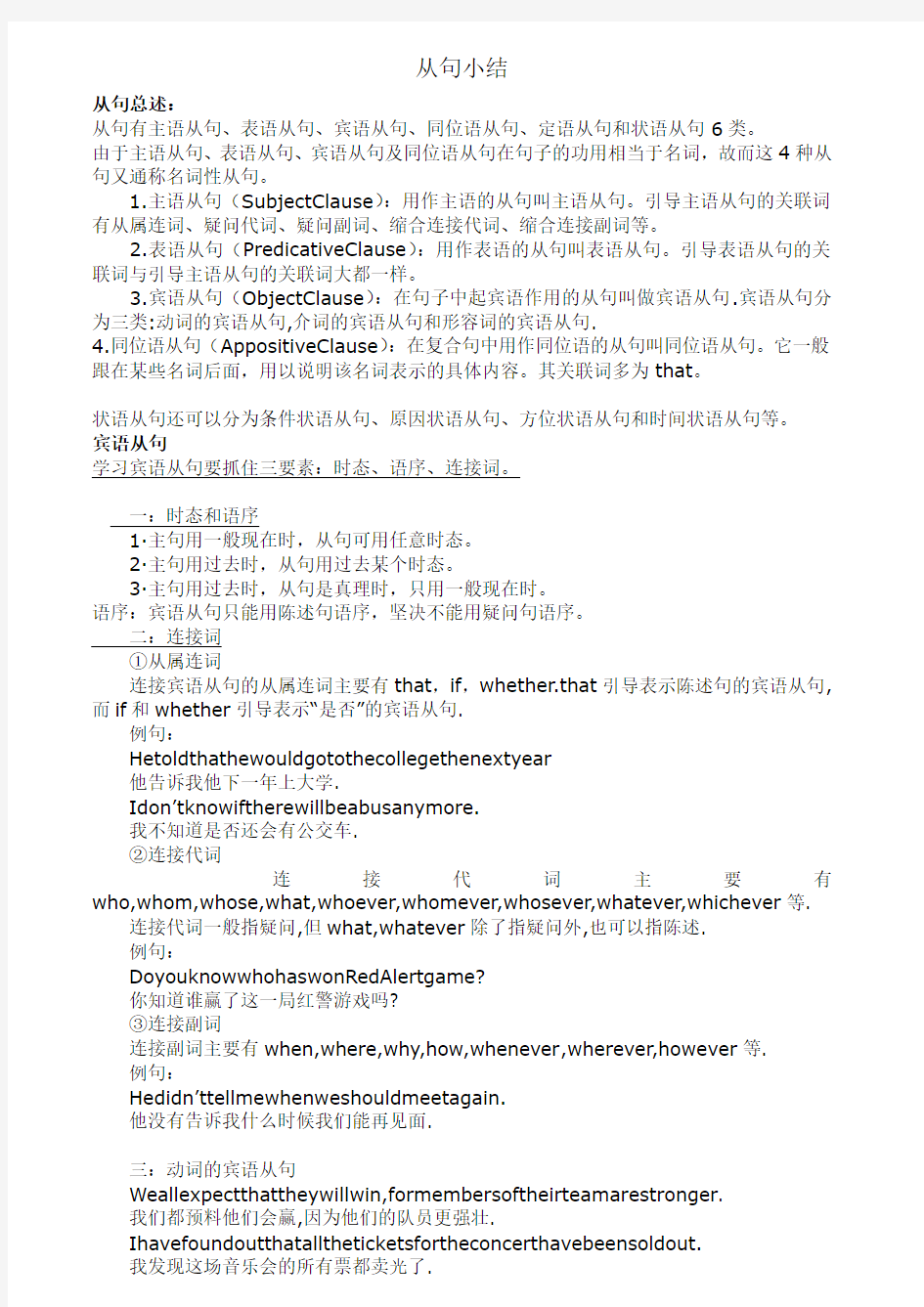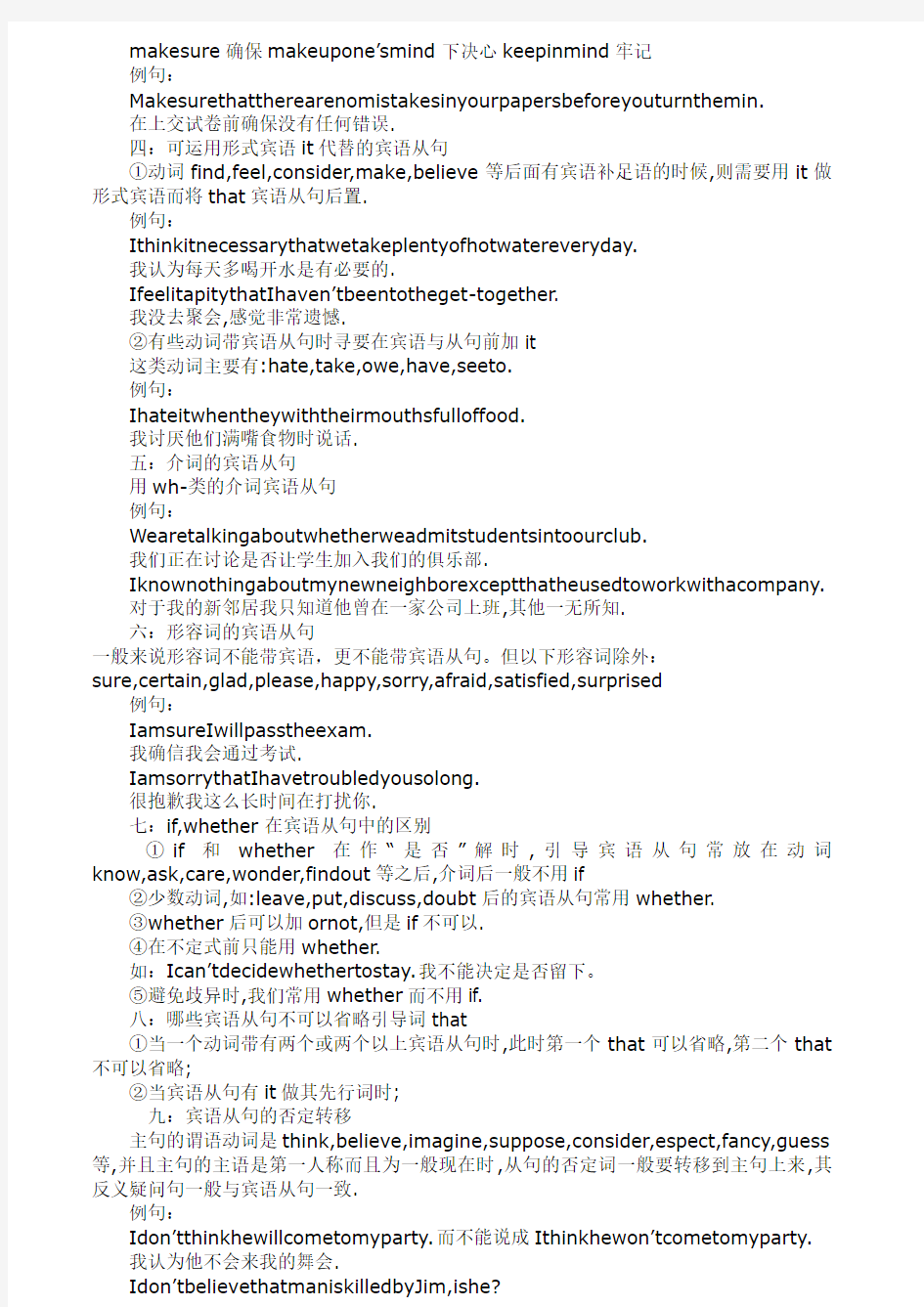从句归纳区分定语从句宾语从句同位语从句


从句小结
从句总述:
从句有主语从句、表语从句、宾语从句、同位语从句、定语从句和状语从句6类。
由于主语从句、表语从句、宾语从句及同位语从句在句子的功用相当于名词,故而这4种从句又通称名词性从句。
1.主语从句(SubjectClause):用作主语的从句叫主语从句。引导主语从句的关联词有从属连词、疑问代词、疑问副词、缩合连接代词、缩合连接副词等。
2.表语从句(PredicativeClause):用作表语的从句叫表语从句。引导表语从句的关联词与引导主语从句的关联词大都一样。
3.宾语从句(ObjectClause):在句子中起宾语作用的从句叫做宾语从句.宾语从句分为三类:动词的宾语从句,介词的宾语从句和形容词的宾语从句.
4.同位语从句(AppositiveClause):在复合句中用作同位语的从句叫同位语从句。它一般跟在某些名词后面,用以说明该名词表示的具体内容。其关联词多为that。
状语从句还可以分为条件状语从句、原因状语从句、方位状语从句和时间状语从句等。
宾语从句
学习宾语从句要抓住三要素:时态、语序、连接词。
一:时态和语序
1·主句用一般现在时,从句可用任意时态。
2·主句用过去时,从句用过去某个时态。
3·主句用过去时,从句是真理时,只用一般现在时。
语序:宾语从句只能用陈述句语序,坚决不能用疑问句语序。
二:连接词
①从属连词
连接宾语从句的从属连词主要有that,if,whether.that引导表示陈述句的宾语从句,而if和whether引导表示“是否”的宾语从句.
例句:
Hetoldthathewouldgotothecollegethenextyear
他告诉我他下一年上大学.
Idon’tknowiftherewillbeabusanymore.
我不知道是否还会有公交车.
②连接代词
连接代词主要有who,whom,whose,what,whoever,whomever,whosever,whatever,whichever等.
连接代词一般指疑问,但what,whatever除了指疑问外,也可以指陈述.
例句:
DoyouknowwhohaswonRedAlertgame?
你知道谁赢了这一局红警游戏吗?
③连接副词
连接副词主要有when,where,why,how,whenever,wherever,however等.
例句:
Hedidn’ttellmewhenweshouldmeetagain.
他没有告诉我什么时候我们能再见面.
三:动词的宾语从句
Weallexpectthattheywillwin,formembersoftheirteamarestronger.
我们都预料他们会赢,因为他们的队员更强壮.
Ihavefoundoutthatalltheticketsfortheconcerthavebeensoldout.
我发现这场音乐会的所有票都卖光了.
makesure确保makeupone’smind下决心keepinmind牢记
例句:
Makesurethattherearenomistakesinyourpapersbeforeyouturnthemin.
在上交试卷前确保没有任何错误.
四:可运用形式宾语it代替的宾语从句
①动词find,feel,consider,make,believe等后面有宾语补足语的时候,则需要用it做形式宾语而将that宾语从句后置.
例句:
Ithinkitnecessarythatwetakeplentyofhotwatereveryday.
我认为每天多喝开水是有必要的.
IfeelitapitythatIhaven’tbeentotheget-together.
我没去聚会,感觉非常遗憾.
②有些动词带宾语从句时寻要在宾语与从句前加it
这类动词主要有:hate,take,owe,have,seeto.
例句:
Ihateitwhentheywiththeirmouthsfulloffood.
我讨厌他们满嘴食物时说话.
五:介词的宾语从句
用wh-类的介词宾语从句
例句:
Wearetalkingaboutwhetherweadmitstudentsintoourclub.
我们正在讨论是否让学生加入我们的俱乐部.
Iknownothingaboutmynewneighborexceptthatheusedtoworkwithacompany.
对于我的新邻居我只知道他曾在一家公司上班,其他一无所知.
六:形容词的宾语从句
一般来说形容词不能带宾语,更不能带宾语从句。但以下形容词除外:
sure,certain,glad,please,happy,sorry,afraid,satisfied,surprised
例句:
IamsureIwillpasstheexam.
我确信我会通过考试.
IamsorrythatIhavetroubledyousolong.
很抱歉我这么长时间在打扰你.
七:if,whether在宾语从句中的区别
①if和whether在作“是否”解时,引导宾语从句常放在动词know,ask,care,wonder,findout等之后,介词后一般不用if
②少数动词,如:leave,put,discuss,doubt后的宾语从句常用whether.
③whether后可以加ornot,但是if不可以.
④在不定式前只能用whether.
如:Ican’tdecidewhethertostay.我不能决定是否留下。
⑤避免歧异时,我们常用whether而不用if.
八:哪些宾语从句不可以省略引导词that
①当一个动词带有两个或两个以上宾语从句时,此时第一个that可以省略,第二个that 不可以省略;
②当宾语从句有it做其先行词时;
九:宾语从句的否定转移
主句的谓语动词是think,believe,imagine,suppose,consider,espect,fancy,guess 等,并且主句的主语是第一人称而且为一般现在时,从句的否定词一般要转移到主句上来,其反义疑问句一般与宾语从句一致.
例句:
Idon’tthinkhewillcometomyparty.而不能说成I thinkhewon’tcometomyparty.
我认为他不会来我的舞会.
Idon’tbelievethatmaniskilledbyJim,ishe?
我认为那个人不是Jim所杀的,是不是?
★如果宾语从句中有某个含有否定意义的形容词或副词,其反义疑问句要用肯定形式.
例句:
Wefindthatheneverlistenstotheteachercarefully,doeshe?
我们发现他从来不仔细听老师讲课,是不是?
十:宾语从句的时态和语序
当主句为现在时或将来时的时候,宾语从句的时态一般不受主句的时态所影响.
当主句为过去时的时候,从句只能用和过去相关的时态。
例句:Thereporteraskedifthegovernmentwouldtakenecessarymeasurestoputdownthet o-do.
记者问政府是否会采取必要的措施镇压骚乱.
★如果从句是一个客观真理,那么从句的时候不根据主句的时态而变化
例句:
Theteachersaidthatthemoongoesaroundtheearthyesterday.
老师昨天说月亮绕着地球转.
★宾语从句的插入语形式
例句:
Whodoyouthinkthepublicmightchooseastheirfavoritesingerthisyear?
你认为今年公众会选谁为他们最喜欢的歌手.
同位语从句(AppositiveClause):在复合句中用作同位语的从句叫同位语从句。它一般跟在某些名词后面,用以说明该名词表示的具体内容。其关联词多为that。
一、如:
Iheardthenewsthatourteamhadwon.我听到了我们队获胜的消息。
Ihadnoideathatyouwerehere.我不知道你在这里。
二、可以跟同位语从句的名词通常有news,idea,fact,promise,question,doubt,thought,hope,message,suggestion,words(消息),possibility等,可展开来的抽象名词。如:
I’vecomefromMrwangwithamessagethathewon’tbeabletoseeyouthisafternoon.我从王先生那里来,他让我告诉你他今天下午不能来看你了。
三、英语中引导同位语从句的词通有连词that,whether,连接副词how,when,where 等。根据句意决定该用哪一个。
lhavenoideaWhenhewillbeback.我不知道他什么时候回来。
定语从句(AttributiveClause):用作定语的从句叫定语从句。
定语从句一般皆放在被它所修饰的名(代)词之后,这种名(代)词就叫作先行词(Antecedent)。引导定语从句的关联词为关系代词和关系副词。关系代词在定语从句中可用作主语、宾语、定语等;关系副词在定语从句中用作状语。
①引导定语从句的关联词有who,whom,whose,that,when,where,why和which.在非限制定语从句中,只可用which,who,whose,where,when.,如果指代前面整个句子,多用which.
例句:
Thedogthat/whichwaslosthasbeenfound.(失踪的狗已经找到了。)Thosewhoareinfavoroftheproposalareexpectedtodiscussitindetailafterthemeetin g.(有人认为那些对这个提案有兴趣的人最好是在会后再具体讨论它。)
Therearemanyorganizationswhosepurposeistohelpthehomeless.(存在着许
多旨在帮助无家可归者的组织。)
②当引导定语从句的先行词前有all,any,no,little,much,veryfirst等词,或先行词前为形容词最高级所修饰时,或先行词为all,anything,nothing,something,everything时,从句的引导词只能用that.
Theonlythingthatmatterstothechildrenishowsoontheycanhavetheirholiday.(孩子们唯一关心的是他们什么时候放假。)
Thesearetheverypointsthatpuzzleme.(真正困扰我的是这些观点。)
Isthereanythingthatbothersyou?(有什么事烦着你吗?)
Thisisthebestfilmthatwaseverproducedbythecompany.(这部是那个公司有史以来拍摄得最好的电影。)
③as可做引导词引导定语从句,多和such,thesame连用.或者用在“从句比主句先发生”的情况,有“像……一样”之意。As引导的定语从句也可修饰整个句子,既可放在先行词后,也可放在句子开头.
例句:
Suchpeopleasyoudescribearerarenowadays.(你描述的那一类人现在很少了。)Theboywasrunoverbyamotor-car,asoftenhappenedinpre-liberationShanghai.(那个男孩被一辆摩托轧过去了,这种事在解放前的上海是不少见的。)
Asisoftenthecase,thegirlforgottobringherdictionary.(正如往常一样,这个女孩又忘了带上字典。)
④介词+which/whom/whose从句
Thedriveristhemanfromwhoseroomshehadstolenthegoldwatch.(她就是从那个司机的房间偷了金表的。)
Languageisatoolbymeansofwhichpeoplecommunicateideaswitheachother.(语言就是人们用来和其他人交流的一种工具。)
例题:
Waterdissolvesapartofnearlyeverything_______itcomesincontact.
a.where
b.thatcwithwhichdassoonas
⑤代/名+介词+which从句
Heisneedingabook,thenameofwhichIdon'tknow.(他需要一本书,但是我不知道书名。)
Infactoriesandinourdailylife,therearemanywastematerials,allofwhichcanheturne dintousefulthingsundercertaincondition.(在工厂里,在我们的日常生活中都有很多垃圾,其实这些垃圾在某种情况下是可以转变为有用的东西的。)
同位语从句与定语从句的区别。
1、同位语从句与前面的名词是同位关系,即说明它前面名词的内容;而定语从句与前面的名词是修饰与被修饰关系,即限定它前面的名词范围,或补充一些情况。如:Thenewsthatlhavepassedtheexamistrue.我通过了考试这一消息是真的。
(同位语从句,即从句所表达的意思就是前面名词的内容。)
Thenewsthathetoldmejustnowistrue.他刚才告诉我的消息是真的。
(定语从句,从句对前面名词起修饰限制作用,即“他告诉我的”那个消息,而不是别的消息。)
2、引导同位语从句的that是连词,在从句中不充当任何成份,而引导定语从句的that 是关系代词,除起连接作用外,还在从句中充当主语、宾语或表语等。如:Theideathatcomputerscanrecognizehumanvoicessurprisesmanypeople.
计算机能够识别人的声音的想法使许多人感到惊奇。(that在从句中不充当任何成份。)Theideathathegavesurprisesmanypeople.他提出的观点令许多人感到吃惊。
(that在从句中作gave的宾语。)
状语从句(AdverbialClause):用作状语的从句叫作状语从句。其关联词是一些从属连词。
修饰主句中的动词,形容词和副词,通常有从属连词引导,按其意义和作用可分为时间,地点,条件,原因,让步,目的,结果,方式,比较.等
分类
1.时间状语从句:
1)常见连词有after,as,before,once,since,till,(not)until,when,whenever (nomatterwhen),while,aslongas…
2)nosooner…than,hardly(scarcely,barely)…when:刚做…就….
NosoonerhadIopenedthedoorthanthetelephonerang.
3)还有immediately,directly,instantly,themoment,theminute,theinstant,thesecond,eve rytimeetc
I’lltellyouaboutitthemomentyoucome.
IgotintouchwithhimimmediatelyIreceivedhisletter.
2.地点状语从句:一般用whereorwherever引导
IwillstandwhereIcanseetheparadeclearly.
Wherevertheywent,theywerewarmlywelcome.
3.条件状语从句:真实条件从句:if,unless,solongas,providedthat,supposingthat,onconditionthat,intheeventth at,incasethatetc
Iwillnotgotoherpartyifshedoesn’tin viteme.
Iwillnotgotoherpartyunlesssheinvitesme.
4.原因状语从句:从属连词有because,as,since,for,now,that,inthat,seeingthat,consideringthat(鉴于,由于) Astheschoolregulationsarewrittenquiteclearly,thereisnothingmoretobeexplained.
Consideringthatthesweaterwashardmade,itwasnotexpensive.
Seeingthattheyareinexperienced,theyaredoingquiteagoodjob.
5.让步状语从句:
1):evenif,though,eventhough,while(尽管)nomatterwhat/how/which,however,whatever,whichever,howeveretc.
Hewillnotgiveupsmokingeventhoughthedoctoradviseshimto.
Whatevertheconsequencemaybe,Iwillbeonyourside.
Howeverhardshetriedtoexplain,nobodytrustedher.
Ithasbeenthesameresult,whicheverwayyoudoit.
2)由as引起的让步从句,语气较强烈,被强调的词须放在句首.
Simpleasthequestionmayseem,itisnotatallcommoninnature.
Coldasitis,thechildrenplayoutdoors.
MuchasIrespecthim,Ican’tagreewithhim.
Objectasyoumay,Iwillgoonwithmyplan.
3)whether…or,不管…或…
whetheryoubeastudentorateacher,youarerequiredtoobeytheregulationsofthesch ool.
6.结果状语从句:sothat,so…that,such…that
Heissohumorousthatwe’llneverfo rgethim.
Sheissuchanicegirlthateverybodylikestomakefriendswithher.
7.目的状语从句:sothat,inorderthat,forfearthat,lest,incase
Icheckedalltheresultstimeandagainforfearthatthereshouldbeanymistakes.
Telephoneusinadvanceinorderthatwemightmakethenecessaryarragements.
8.方式状语从句
方式状语从句通常由as,(just)as…so…,asif,asthough引导。
1)as,(just)as…so…引导的方式状语从句通常位于主句后,但在(just)as…so…结构中位于句首,这时as从句带有比喻的含义,意思是"正如…","就像",多用于正式文体,例如:
Alwaysdototheothersasyouwouldbedoneby.
你希望人家怎样待你,你就要怎样待人。
Aswateristofish,soairistoman.
我们离不开空气,犹如鱼儿离不开水。
Justaswesweepourrooms,soweshouldsweepbackwardideasfromourminds.
正如打扫房屋一样,我们也要扫除我们头脑中落后的东西。
2)asif,asthough
两者的意义和用法相同,引出的状语从句谓语多用虚拟语气,表示与事实相反,有时也用陈述语气,表示所说情况是事实或实现的可能性较大。汉译常作"仿佛……似的","好像……似的",例如:
Theycompletelyignorethesefactsasif(asthough)theyneverexisted.
他们完全忽略了这些事实,就仿佛它不存在似的。(与事实相反,谓语用虚拟语气。)Helooksasif(asthough)hehadbeenhitbylighting.
他那样子就像被雷击了似的。(与事实相反,谓语用虚拟语气。)
Itlooksasiftheweathermaypickupverysoon.
看来天气很快就会好起来。(实现的可能性较大,谓语用陈述语气。)
说明:asif/asthough也可以引导一个分词短语、不定式短语或无动词短语,例如:Hestaredatmeasifseeingmeforfirsttime.
他目不转睛地看着我,就像第一次看见我似的。
Heclearedhisthroatasiftosaysomething.
他清了清嗓子,像要说什么似的。
Thewavesdashedontherocksasifinanger.
波涛冲击着岩石,好像很愤怒。
9.比较状语从句:
1)as…as,notso/as…as
thefilmwasnotsoexcitingasweexpected.这部电影没有我们期待的一样精彩
Thehistoryofnursingisasoldasthehistoryofman.
ShelikesthemalmostasmuchasPauldoes.
2)比较级+than,somuch/alotmorethan
Shelooksmuchyoungerthansheis.
Theuniverseisalotmorecomplicatedthanyouthink.
3)nomore…than,notmore…than,less…than
JackisnotmorefrightenedthanMikeis.不像马克那么害怕
TomisnomorerichthanBlack
3)themore…themore
Thefarthernorthyougo,thesevererthewinteris.
ThemoreIseeofhim,thelessIlikehim.
